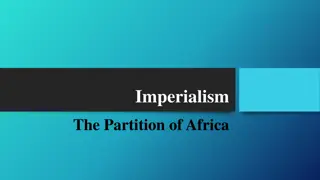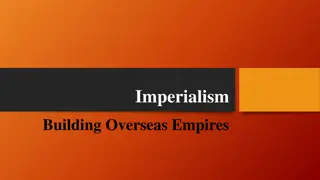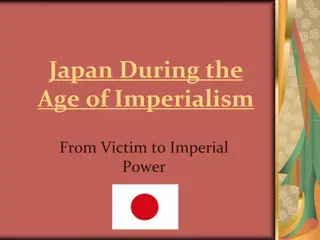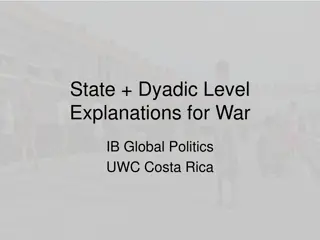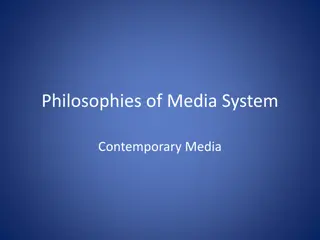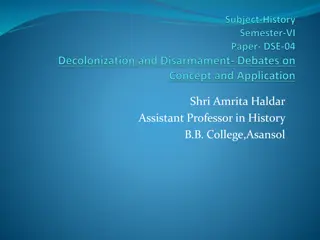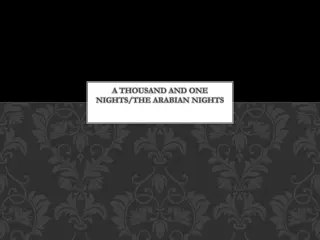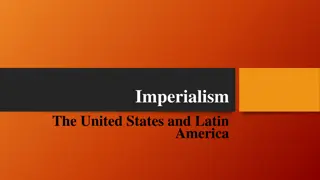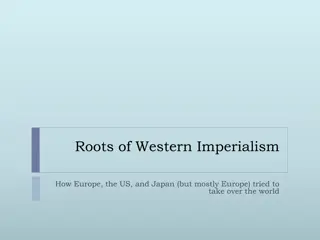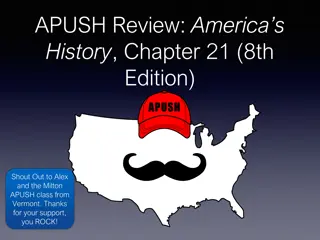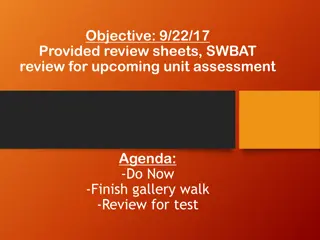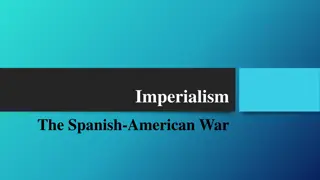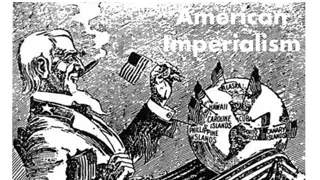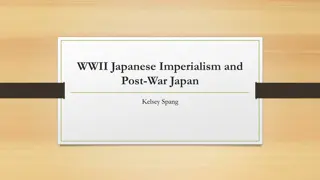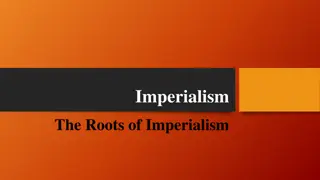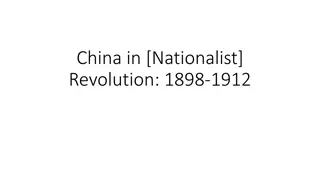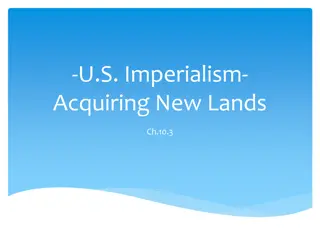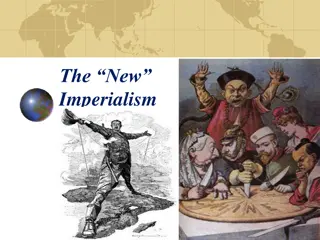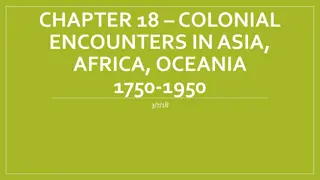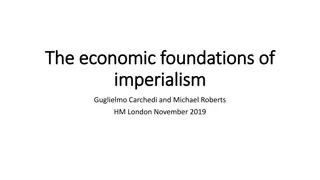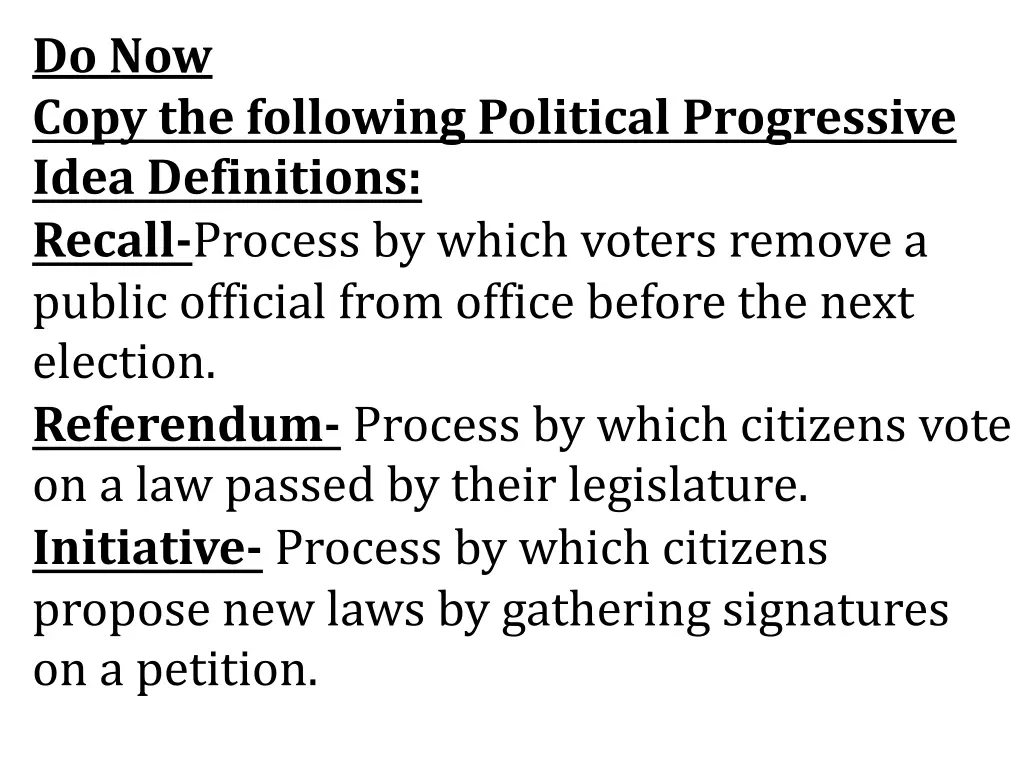
Progressive Era Political Reforms and Leaders
Explore the political progressive ideas and key figures during the Progressive Era, including definitions of recall, referendum, and initiative processes, as well as the impact of leaders like Robert La Follette, Theodore Roosevelt, and initiatives in conservation and trust-busting.
Download Presentation

Please find below an Image/Link to download the presentation.
The content on the website is provided AS IS for your information and personal use only. It may not be sold, licensed, or shared on other websites without obtaining consent from the author. If you encounter any issues during the download, it is possible that the publisher has removed the file from their server.
You are allowed to download the files provided on this website for personal or commercial use, subject to the condition that they are used lawfully. All files are the property of their respective owners.
The content on the website is provided AS IS for your information and personal use only. It may not be sold, licensed, or shared on other websites without obtaining consent from the author.
E N D
Presentation Transcript
Do Now Copy the following Political Progressive Idea Definitions: Recall-Process by which voters remove a public official from office before the next election. Referendum- Process by which citizens vote on a law passed by their legislature. Initiative- Process by which citizens propose new laws by gathering signatures on a petition.
Primary- When voters cast ballots to select nominees for upcoming elections. Secret Ballot- is a voting method in which a voter's choices in an election or a referendum are anonymous. Limits people trying to influence a voters choice.
Progressives at the State Levels Robert La Follette oIn the state of Wisconsin oThe first to pass legislation to regulate Railroads Banks Lobbying oBecomes a role model for other states oOther state governors follow the progressive ideas Hariam Johnson from California Theodore Roosevelt from New York oAs NYC police chief and governor TR become very friendly with famous muckrakers oThose include Jacob Riis
Progressives Presidents Theodore Roosevelt oBecomes President after the assassination of William McKinley oTR believes the President should be a role model for all oHis Presidency will become known as the Square Deal Consumer Protection Meat Inspection Act (1906) Pure Food and Drug Act (1906) oMade manufacturers label ingredients
Conservation Gives more power to the US Forest Service Places 150 million acres under federal protection Believed that forests need to be used not abused
Trust Busting Believed that there was good and bad trusts. Those that hurt the public need to be destroyed. TR breaks up a trust held by Morgan Northern Securities. oUsed the Sherman Anti- Trust law. oMade headlines.
Supporting Organized Labor oFirst president to help support labor during a strike. oCoal strike of 1902. oTR threatens to take over the mines. oWorkers get some of the usual three demands.
Progressives Presidents William Howard Taft oIs seen as a failure Comes after TR Fires the TR s choice of the Forest Services Raised Tariffs which made prices higher TR comes back from Africa and calls him a failure oTaft actually destroys twice as many trusts 16thAmendment- Graduated Income Tax The more you make the more you pay 17thAmendment- Direct Election of Senators Public was to vote on Senators directly Was to stop political corruption
Progressives Presidents Woodrow Wilson and the New Freedom oWilson wins the election of 1912 Taft runs as a Republican TR runs in a new party called the Bull Moose Party Party Platform based on Progressive ideas Financial Reforms Lowers the tariff Graduated Income Tax or the Progressive Tax The more you make the more you are taxes Federal Reserve System There were now 12 districts
Progressives Presidents Allowed the government to issue Federal Reserve Note oControl the amount of money in circulation oPull old money out of circulation oControl of Big Business with the Clayton Anti-Trust Act oSupported more Labor efforts End child labor Women get suffrage
Do Now Why do you think Taft was seen as a failure?
Imperialism: o Imperialism Definition a policy of extending nations authority through economic, political and/or military means o American reasons New Technology Ideas spread via newspaper, telegraph, etc. Easier to move products, people and ideas via the railroad This made the world more interdependent Big Business Needs Need new areas for raw materials Belief that with new markets they would sell more goods US becomes part of the interdependent world
Imperialism: Larger Navy Alfred Mahan writes about the need for a large navy oStates all empires started with a navy oUS needs to increase naval strength oTR is part of Navy Department and agrees oUS creates the Great White Fleet Navy would allow for trade with Asia oNavy would protect ships oNavy would increase area
Imperialism: Need for refueling spots Closing of the Frontier and Manifest Destiny was completed People believe they need to expand Need to spread American Culture Follows the ideas of the White Mans Burden People need to be like Americans Nations need oDemocracy oSpread Christianity
Imperialism: oOpening of Japan First visited by Commodore Matthew Perry in 1854 US opens a new market and realizes that Asian trade is important Japan moves from isolation to become a world power US wants to check this power for many years until WW II
Imperialism Pacific advances for Imperialism China Importance Had been a site of European Imperialism China had many raw materials
Imperialism: oUS wants an Open Door Policy During the 1800s each European imperial power had a Sphere of Influence These were areas where only that nation could trade The US does not have a Sphere of Influence 1899 Secretary of State John Hay proposes the Open Door Policy Each nation in China would allow the US to trade European Powers refuse
Imperialism: oBoxer Rebellion The Boxers were a group from the Righteous Fists of Harmony They wanted foreigners out US helps put down rebellion US demands and gets the Open Door Policy
Imperialism: Hawaii oPrior to 1898 was independent oDuring the Gilded Age American business started dominate the island sugar monopoly oIn time the Planters became very powerful and had fears The US had a high tariffs Fear of Hawaiian nationalism
Imperialism: oIn 1891 American Businessman Sanford Dole started a revolution Queen Liliuokalani was overthrown US sent in troops to protect Americans oIn 1898 President William McKinley annexed Hawaii In 1899 the US gains a portion of Samoa Small Island in the Pacific Ocean Other islands are added during the late 1800s US needs Hawaii, Samoa and other areas are seen as fueling stops
Do Now What were three causes of American Imperialism? New Technology, Big Business needs and large navy
Spanish American War Long Term Causes oCuba was imperialized by Spain Heavy taxes from Spain Economic collapse occurred oCubans were imprisoned Most were political prisoners About 40% died from starvation and disease
Spanish American War oUS was looking to expand TR, Senator Henry Cabot Lodge wanted to expand Saw Spain as a weak power to take land from US also had jingoism Meaning that were super patriotic Wanting to show other nations were a world power
Spanish American War Short Term Causes oYellow Journalism William Hearst and Joseph Pulitzer Both owned newspapers Willing to do anything to sell papers Both the New York Morning Journal and the New York World printed stories that were exaggerated Often the stories made up Hearst famous quote You furnish the pictures I will furnish the war This caused more calls for war
Spanish American War Short Term Causes oThe De Lome Letter Spanish diplomat that said political leaders of the US were weak Many Americans demand war Sinking of the USS Maine The Maine was sent to Cuba to Protect American interests Sent a week after the DeLome Letter On February 15, 1898 the Maine exploded oKilled 266 soldiers Spain was blamed
Spanish American War oWar declared On April 20, 1898 The war only lasts four months TR resigns from the Navy and leads the Rough Riders Famous battle they win is San Juan Hill This will help TR when he becomes President In the Caribbean more soldiers die of disease than bullets In the Philippines the US is helped by Filipino
Spanish American War oResults of the Spanish-American War US Gained Puerto Rico Guam Philippines Cuba US is seen as a world power There are new markets for goods
Spanish American War The impact on the new areas Puerto Rico and Guam would become protectorates of the USA oUnder the control and protection of a larger nations oUS used Foraker Act on Puerto Rico US could appoint governor US control all foreign policy oIn 1952 both became commonwealths US citizenship Protection of American law
Spanish American War The impact on the new areas Philippines o Emilio Aguinaldo wanted the Philippines to be independent o US promises independence with Jones Act o US does not give independence until WW II Cuba o Gave Cuba independence o However Cuba had to follow the Platt Amendment US had to approve all treaties US had the power to restore law and order US could lease naval bases This is why we have Guantanamo Bay
Do Now What were the results of the Spanish American War? Cuba, Puerto Rico, Philippines and Guam.
Latin American Policies United States and Latin America Where is Latin America? oAny nation Mexico and South Roosevelt Corollary oIs an extension of the Monroe Doctrine To keep out foreign nation oTR believed that it was the US s job to restore law and order US should be able to intervene anytime in Latin America The US was to become a international police force
Latin American Policies oHe uses this idea when European nations tried to expand influence in Latin America oTo enforce this corollary TR uses the navy This will be called the big stick policy TR would Speak softly but carry a big stick Used in: Nicaragua Dominican Republic Helped to start a revolt in Panama
Latin American Policies oUS wanted a shorter path to trade and military Found that the Panama Isthmus was the shortest route The land was owned by Columbia TR tries to buy the land but Columbia refuses TR then allows the War Department to send hints that the US will support a revolt To ensure the revolt TR sends the Big Stick The US then takes over the canal started by France US finishes the canal from 1901 to 1914
Latin American Policies Taft and Dollar Diplomacy oBelief that the US needed to invest more in Latin America oAs the US becomes more involved the US begins to send in more troops oTaft actually begins to support a dictator in Nicaragua oShowed US was going to use economic leverage to be imperialistic
Latin American Policies Wilson and Moral Diplomacy oBelieved that US should condemn imperialists oThat nations should have self- determination oThere should be no military used oWilson becomes a hypocrite During the Mexican Revolution Wilson sends troops in three times Stated he was trying to Protect Americans
Do Now Why did the U.S. want the Panama Canal?
World War I World War One in Europe (1914-1918) Europe goes to war for four reasons oImperialism Each nation was pushing for its own colonies Nations were willing to fight each other oNationalism Nations had a great deal of national pride
World War I oSecret Alliances There were two alliances Triple Alliance or Central Powers oItaly, Austria-Hungry, and Germany Triple Entente or the Allies oRussia, France, and Great Britain
World War I oMilitarism Germany was building a large navy Wanted to challenge Great Britain Other nations were building large armies WWI spark was the assassination of Archduke Ferdinand oAfter he is shot the above four make the war starts
World War I United States enters WWI in 1917 The US and Woodrow Wilson wanted to follow the precedent set by George Washington when it came to foreign wars, which was Isolationism. oCauses Cultural Link US has more in common with the Allies Most Allies are democratic
World War I Propaganda Defined as spreading of ideas that help one cause and/or hurtanother Most of the propaganda came from the Allies Economic US states that it wanted the freedom of the seas They wanted to trade with all nations US traded more with Allies Most Americans did not believe that trade with allies was bad
World War I Submarine Warfare The Germans needed to stop trade between the US and the Allies The Allies were able to re- supply while the Central Power couldn t To stop this the Germans used U- Boats or Submarines The Germans actually put up a blockade around England Any ship coming near England would be sunk
World War I Sinking of the USS Lusitania (1915) Germany warns all ships to not enter English waters The Lusitania was a British passenger ship Germany sinks ship and kills 1200 o128 were Americans
World War I Events of the 1917 o Germany announced a policy unrestricted submarine warfare Zimmerman Note Note from Germany to Mexico Wanted Mexico to start a war with US In return Germany would declare war in US Russian Revolution Russia overthrew its Czar Russia moved towards democracy Russia pulls out of war Allies need help o In April 1917 the US enters the War on the side of the Allies
Do Now Why did the United States enter WWI? German Unrestricted Submarine Warfare
WWI: American Expeditionary Force There were 2 million American forces in Europe Most supported Allied Positions US involvement turned the tide to the Allies The US lost about 51,000 men, far less than other nations US was seen as the knight in shining armor coming to the rescue
American Home front Selective Service Act (1917) oWas the government creating a military draft oMales from 18 to 45 had to register oMales then would be pulled randomly oSome Americans believed the army should be voluntary
Economy oVictory Gardens People would grow gardens so they would not take food from soldiers Most would can excess for winter oLiberty Bonds Selling of bonds to pay for the war Bonds are a way for government to borrow money oAmerican propaganda Americans were given messages to support the war
Groups of Concerns Pacifists People that did not want war Seen as a danger to the United States Socialists People who believed that all goods and services should be run by the government Seen as a danger to the capitalist system of the US That Everyone must make their own way.
Constitutional issues Espionage and Sedition Acts oEspionage Act No one could interfere with the draft Allowed the Post Master General to stop mailing treasonous materials oSedition Act Stated that anyone could be arrested for printing saying anything against the government

